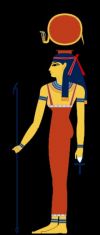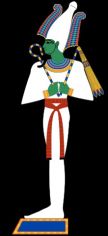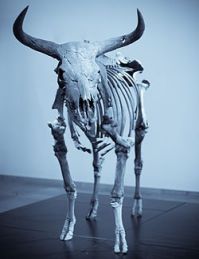Chapter 16
Joseph's Blessing
Moses’ blessing upon Joseph includes both Ephraim and Manasseh, the two sons of Joseph, who were made full tribes in Israel. Joseph received the double portion on account of the birthright.
Jacob had just twelve sons, including Joseph, and when Joseph’s two sons were given full positions as distinct tribes in Israel, there were then thirteen tribes in all. However, Levi was not given a territorial inheritance, so the nation remained just twelve tribes (states or provinces).
Blessings of Natural Resources
Moses says to Joseph in Deut. 33:13-16,
13 And of Joseph he said, “Blessed of the Lord be his land, with the choice things of heaven, with the dew, and from the deep lying beneath, 14 and with the choice yield of the sun, and with the choice produce of the months. 15 And with the best things of the ancient mountains, and with the choice things of the everlasting hills, 16 and with the choice things of the earth and its fulness. And the favor of Him who dwelt in the bush. Let it come to the head of Joseph, and to the crown of the head of the one distinguished [naziyr] among his brothers.
This is an expansion of Jacob’s blessing in Gen. 49:25, 26,
25 … And by the Almighty who blesses you with blessings of heaven above, blessings of the deep beneath… 26 The blessings of your father have surpassed the blessings of my ancestors up to the utmost bound of the everlasting hills; May they be on the head of Joseph, and on the crown of the head of the one distinguished [naziyr] among his brothers.
Joseph was “distinguished” from his brothers. The Hebrew term is naziyr, which means “consecrated, separated, distinguished.” It is also the word for a Nazarite, one who took a special vow (Num. 6:13). Joseph was separated from his brothers after they sold him as a slave, but while in Egypt, Joseph also “distinguished” himself by his position of power under Pharaoh.
Joseph, the Wild Ox
Moses continues in Deut. 33:17,
17 As the first-born of his ox, majesty is his, and his horns are the horns of the wild ox; with them he shall push the peoples, all at once, to the ends of the earth. And those are the ten thousands of Ephraim, and those are the thousands of Manasseh.
The two sons of Joseph were pictured as “the horns of the wild ox.” The “wild ox” that Moses mentions became extinct about 2,000 years ago. It was a fleet-footed ox, much like a cross between an ox and an elk. A few decades before Christ was born, Julius Caesar killed one while hunting. Skeletal remains of wild oxen have been found, giving us a good idea of what they looked like.
Ephraim and Manasseh were to use their horns to “push the peoples… to the ends of the earth.” This was fulfilled many years later when the tribes of Israel were deported and dispersed on account of the golden calves that Jeroboam had built (1 Kings 12:28-30; 13:34). Jeroboam was of the tribe of Ephraim, which was the leading tribe of the House of Israel during the Divided Kingdom. Thus, by their sin, Ephraim pushed the people to the ends of the earth.
The two horns of the wild ox, then, had both positive and negative sides to the prophecy. The wild ox was a picture of strength in the first letter of the Hebrew alphabet (alef = ox), but Ephraim also built and worshiped golden calves. Their very strength became their downfall, being the occasion for Israel’s dispersion.
Perhaps Moses remembered his early days in the court of Pharaoh, where the bull (Apis) was among the gods of Egypt. In their religious system, Hathor was pictured (left) as a mother-god having horns like a bull. The same was true of her son, Osiris, pictured on the right:
 |
 |
It is likely, then, the pharaohs themselves wore ceremonial crowns having two prominent horns on them. Joseph himself may have been given such a crown. If so, this may have been the occasion of Moses’ double-edged prophecy about Ephraim and Manasseh being the two horns of the bull on the crown of the head of Joseph.
Certainly, Moses knew that the Israelites were soon to corrupt themselves (Deut. 31:29) after his death. Perhaps God revealed to him how the horns of Apis prophesied of Ephraim’s apostasy, turning Bethel, Jacob’s “house of God,” into a center of worship for a golden calf (1 Kings 12:29).
Population Ratios Between Ephraim and Manasseh
The population ratio between Ephraim and Manasseh is also prophesied to be ten to one. We are told of the “ten thousands of Ephraim,” but only the “thousands of Manasseh.” Moses was only clarifying the earlier prophecy of Jacob, who prophesied over the sons of Joseph at the time of their full adoption as sons, giving them each a full inheritance as a tribe of Israel. In Gen. 48:19 Jacob says that Manasseh would become a great people, but that his “younger brother shall be greater than he, and his descendants shall become a multitude of nations.”
Ephraim was thus placed before Manasseh to receive the birthright of Joseph along with the name Israel. Ephraim means “double fruitfulness,” which prophesies of the Fruitfulness Mandate that was inherent in the birthright since this Mandate was given in Gen. 1:28. Joseph was the “fruitful bough” (Gen. 49:22), and Ephraim carried this Sonship calling as well.
In Moses’ first census in Numbers 2, we read that Ephraim’s men (ages 20-50) numbered 40,500 (Num. 2:19), and Manasseh numbered 32,200 (Num. 2:21).
When the second census was taken forty years later, Ephraim had dwindled to 32,500 (Num. 26:37), while Manasseh had increased to 52,700 (Num. 26:34). So by the time Israel crossed the Jordan, Manasseh outnumbered Ephraim. It is obvious, then, that Moses’ prophecy was not yet fulfilled at that time.
Geographical Prophecy
In later years the prophecy is fulfilled on two levels. On the earthly level, the Israelites left Assyria and immigrated into the vast forests of Europe (including western Russia). The geography itself prophesied, for the ten tribes became ten nations in Europe, with Britain at the “head.” Britain, in my view, represents Jacob himself.
Joseph was then “separated” from his brothers in North America. As time passed, the land of Joseph then divided into two brotherly nations, Canada and the United States, having a ten-to-one difference in population.
The Fruitfulness Mandate
On a higher level, Ephraim and Manasseh prophesied by their names of heavenly things. Ephraim, “double fruitfulness,” is more than just a matter of population. It is about the Sons of God. When God said in Gen. 1:28 to “be fruitful and multiply,” His intent was not to multiply children of the flesh, but the sons of God. One must have fleshly children in order to turn them into Sons, but fleshly children are not the goal. The divine intent is to transform them into His image (Gen. 1:26).
This is the underlying promise and the reason why Ephraim’s calling was preferred over that of Manasseh. The promise of God was that Ephraim would become “a multitude of nations,” which was also the promise given to Abraham. In Paul’s writings we see this explained, not merely as biological sons of Abraham, but in the metaphoric definition used so often in the Hebrew language. Thus, Paul says in Gal. 3:26-29,
26 For you are all sons of God through faith in Christ Jesus…. 29 And if you belong to Christ, then you are Abraham’s offspring, heirs according to the promise.
Paul understands that Abraham was called to bless all nations (Gen. 12:3), and that the nations themselves could become “children” of Abraham by faith (Gal. 3:7, 14). The Jews—and even Jewish Christians—disagreed with Paul, desiring to retain a class distinction between Jews and non-Jews. The dividing wall in the temple had ingrained into their very culture this division, giving Jewish men the privilege of drawing closer to God in the temple than non-Jews and women.
This dividing wall was never commanded by God, neither in the tabernacle of Moses nor the temple of Solomon, nor even in the second temple of Ezra and Zerubbabel. It was a tradition of men that Christ abolished (Eph. 2:14-16), along with all other traditions of men.
Therefore, the promise to Abraham was passed down to Isaac, Jacob, and then Ephraim. It was the promise of Sonship, and Paul says that it came through faith in Jesus Christ as we are formed into His image and likeness from the inside and not through biology.
The Prophecy of Manasseh
Meanwhile, the promise given to Manasseh prophesies the manner in which Ephraim’s prophecy was to come. Manasseh has to do with forgetting (Gen. 41:51). When he was named, Joseph explained it in two ways: (1) forget all my troubles; and (2) forget my father’s house. Neither is the goal, but both shed light on the path toward the goal.
When the Israelites were dispersed among the nations, they forgot their father’s house. They forgot who they were and became “lost sheep.” Secondly, on the positive side, they were to forget all their troubles. What trouble? Obviously, it refers to Joseph’s trouble when he was sold into slavery. By extension it is also “Jacob’s trouble” (Jer. 30:7, KJV), because the second time of Jacob’s trouble was when he was separated from Joseph, presuming him to be dead.
The time of Jacob’s trouble, which I have often written about, is the entire time when the lost ten tribes of Israel were lost sheep, forgotten by most people, and presumed dead, as prophesied in Ezekiel 34. They were lost partly because of their name changes, but also because men have presumed that the Jews are those lost ten tribes. But the day will come when the truth is known, and then the prophecy of Manasseh will end.
That will also be the time of Ephraim’s Sonship prophecy to emerge in the earth. This greater prophecy will bring fruitfulness to the earth on many levels, the greatest being the manifestation of the Sons of God.

